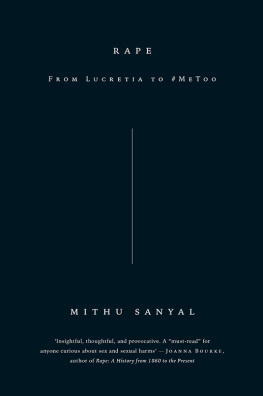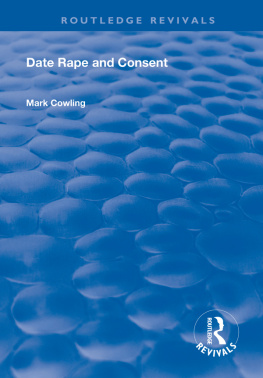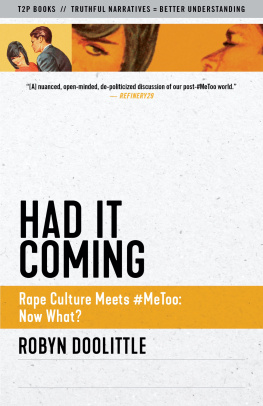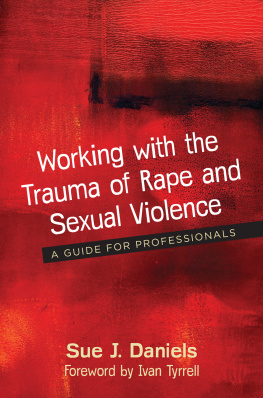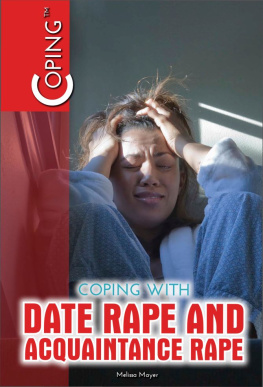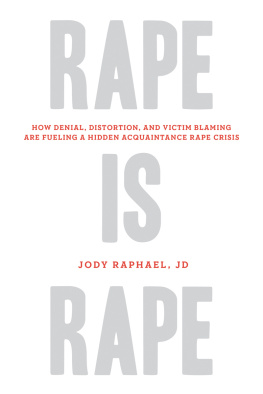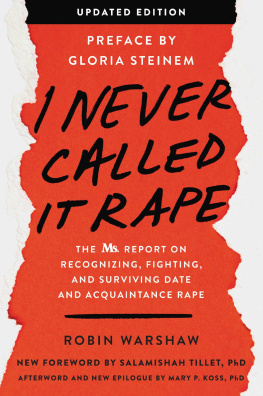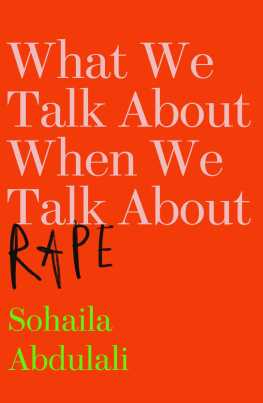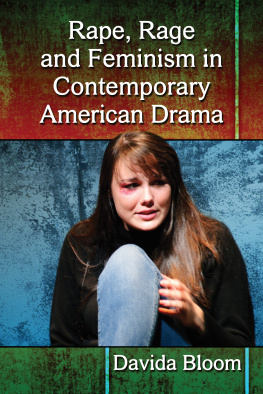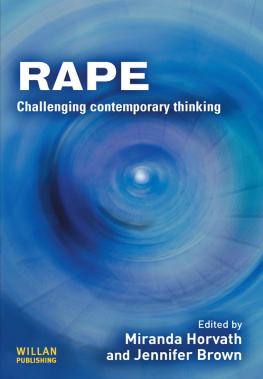Contents

Rape
Rape
From Lucretia to #MeToo
Mithu Sanyal

The translation of this work was funded by Geisteswissenschaften International Translation Funding for Work in the Humanities and Social Sciences from Germany, a joint initiative of the Fritz Thyssen Foundation, the German Federal Foreign Office, the collecting society VG WORT and the Brsenverein des Deutschen Buchhandels (German Publishers & Booksellers Association)
This English-language edition published by Verso 2019
Originally published in German by Editions Nautilus as Vergewaltigung: Aspekte eines Verbrechens, 2016
Mithu Sanyal 2016, 2019
All rights reserved
The moral rights of the author have been asserted
1 3 5 7 9 10 8 6 4 2
Verso
UK: 6 Meard Street, London W1F 0EG
US: 20 Jay Street, Suite 1010, Brooklyn, NY 11201
versobooks.com
Verso is the imprint of New Left Books
ISBN-13: 978-1-78663-750-5
ISBN-13: 978-1-78663-752-9 (UK EBK)
ISBN-13: 978-1-78663-753-6 (US EBK)
British Library Cataloguing in Publication Data
A catalogue record for this book is available from the British Library
Library of Congress Cataloging-in-Publication Data
A catalog record for this book is available from the Library of Congress
Typeset in Sabon LT by Hewer Text UK Ltd, Edinburgh
Printed and bound by CPI Group (UK) Ltd, Croydon, CR0 4YY
Contents
Im not defined by my scars but by my incredible ability to heal.
Lemn Sissay
When I give talks on the topic of this book, I am often asked to give what is commonly known as a trigger warning. The aim of such warnings is to protect traumatized people from being retraumatized, and I agree that this is important. At the same time, I feel uncomfortable treating people who have been victims of violence as if theyve also lost the ability to read. The title of this book (and my talks) is Rape. There is little that a warning could tell you that the title has not already, and I trust that if you are reading this, you are prepared to read a book about the charged issue of rape.
And make no mistake, rape is a charged issue for all of us, with far more impact on our lives than any other crime. Rape informs our mental maps, and determines where many of us go, at what times and (more importantly) where we dont. Moreover, the information we get about rape isnt just information about rape; its also about gender, the relationship of the sexes to each other, and even sexuality. And none of this information is pleasant.
Many people have been fighting so hard and for so long to have sexual assaults recognized as crimes and not just high spirits, that questioning the political convictions that have achieved so much carries the risk of playing into the hands of those who wish to relativize sexual violence. But knowledge is not absolute, and what was right and important forty years ago may have changed. Therefore it is necessary to reconcile our views with the new realities.
More importantly, to question something doesnt mean to reject it. In the words of legal and political scholars Wendy Brown and Janet Accordingly, this book is notand cannot bea comprehensive cultural history from the first documented rape to the present day, but an attempt to trace narratives and make visible the lines of connection. It examines some of our basic convictions that have hardened into consensus truths, to probe whether they are still useful for us today. In other words: This is a book about what we talk about when we talk about rape.
This is obviously easier said than done, because rape is a veritable hall of mirrors of expectations and discourses, and each sentence is followed by ten unspoken ones. I call this a cultural sore spot. Like sore spots on the body, cultural sore spots indicate something that needs our attention but that we are afraid to touch. It is little wonder that this book has encountered more resistance than any of my other texts. My first publisher was delighted when I told them I was working on my second bookuntil I told them what it was about. My first book, a cultural history of the vulva, has become a standard work in Germany and publishers were queuing up to do my next book only to bail out at the last minute. Only Nautilus, in Germanyand now Verso Booksdared to do it, and my inner censor, too, had never been so shrill, nor had the knots in my brain ever been so tightly wound. That meant that this book took a lot longer to see the light of the bookshop than Id anticipated. This turned out to be an advantage. So much happened during that time that could be included in these pages: the mass sexual harassment on New Years Eve 201516 in Cologne, legal reforms in Germany, Title IX complaints on American campuses, Donald Trumps pussy-grabbing comments, and the allegations against Harvey Weinstein and #metoo.
It should be self-evident that not everyone has to share my conclusions, but rape is a topic where nothing is self-evident. So Ill give it to you in writing: Do what you will with this book. Give it to your best friend, use it as a coaster for your coffee cup, throw it against the walljust please, please dont let it tell you that your feelings are wrong.
Since political, economic, and cultural environments change, so too must sexual violence and our perception of it.
Despite the fears of many event organizers that my talks would trigger trauma in the audience, I regularly encounter the complete opposite. As if a dam were breaking, there is often a palpable relief. Listeners tell me personal stories during the lecture, and even more afterward, and the overwhelming feeling is that this subject was just waiting to be pulled out of the closet, dusted off, and reexamined. After alland I only noticed it at this pointhere was something I only ever talked about with friends as something abstract and theoretical, usually when a prominent case was in the media. Any connection to our own lives seemed to be carefully avoidedexcept our fear of dark streets at night.
This lack of language is usually interpreted as shame: that our experiences are too painful and embarrassing to share outside protected spaces. But how did that correlate with the complete strangersof all sexeswho came to me after each lecture and talked to me about what I could not talk about with my friends?
Hardly any subject is as full of contradictions as rape. What other fear lurks behind every corner yet is at the same time supposed to be as rare as being hit by lightning? Where can you encounter so many crude and anachronistic concepts of human beings that dont resemble the human beings you know? Intimate spaces collide with political constructs, and the general uncertainty is only too palpable. Thats not surprising in view of all the double binds that entwine the subject as if it were a castle tower with a perfect, beautiful virgin sleeping behind the thorns.
Rape is not just a word, it is a whole storywith a beginning and a tragic ending, part cautionary tale, part sensational literature. Just the sound of the word makes one want to put this book down and read something else. Its important to break with that narrative as well. Just because rape is such a depressing subject, this doesnt have to be a depressing book. Hacking through the thorns, I have done my best to make this book as liberating and empowering as I could. After all, it is a reappropriation of how we think and act. And the way we think and act has consequences: changing how we imagine something can change the way it has power over us.

